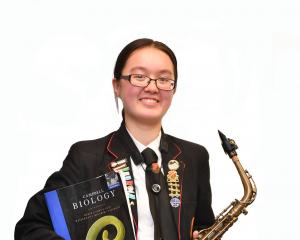
We asked those who received Otago Daily Times Class Act awards for excellence in high school 10 years ago what sets their generation apart from others.
Unsurprisingly, many touched on technology, describing themselves as the ‘‘link between the old and new ways of living’’ — the last generation that did not grow up with social media from a young age but who adopted it in their teenage years.
- Bayfield High School
- Blue Mountain College
- Columba College
- Cromwell College
- Dunstan High School
- East Otago High School
- Gore High School
- John McGlashan College
- Kaikorai Valley College
- Kavanagh College
- King's High School
- Lawrence Area School
- Logan Park High School
- Maniototo Area School
- Mount Aspiring College
- Otago Boys' High School
- Otago Girls' High School
- Queen's High School
- Roxburgh Area School
- St Hilda's Collegiate
- St Kevin's College
- St Peter's College
- South Otago High School
- Taieri College
- Tokomairiro High School
- Waitaki Boys' High School
- Waitaki Girls' High School
- Wakatipu High School
‘‘This makes us different to older generations because we aren’t afraid of new technology and adapt to the changes, but we also aren’t defined by it and realise there is life outside of social media,’’ said Rebekah Greene.
‘‘We’re capable of using floppy discs, flip phones and Walkmans,’’ Alex Pasco added, ‘‘while simultaneously being comfortable using a 3-D printer or mining for Bitcoin.’’
Being exposed to many different ideas through the internet and social media had made them more aware of social issues than previous generations, said the group, most of whom are aged 27 or 28.
Growing up with massive change meant they had also developed an ability to adapt and knew the value of ‘‘wearing many hats at once’’.
Several thought they had more opportunities but Patrick Dawson said people of previous generations, when young, had a licence to dream about big ideas in a way that his generation tended not to.
‘‘[They] at least got to dream about getting rich, world peace, flying cars, political revolutions, you name it. By contrast, much of my generation just hope they’ll have a decent job, a house [and] maybe some kids.’’
Saasha Bruce said they did not like being told that something was impossible while Jordyn Walker felt her cohort was bolder than those they followed, ‘‘though not as bold as the ones following us’’.
Some mentioned the challenges their generation faced, Lisa Craw saying climate change was ‘‘a real threat, and not a ‘future problem’ as it was for others’’.
Covid-19 is another pressing issue and three had lost their jobs as a result of the pandemic. Many more had cancelled overseas travel — at least one using their savings for a house deposit instead.
Only seven of the 52 recipients who responded are living overseas and five of those are in Australia.
Douglas Wood worked in Wellington Hospital’s emergency department during lockdown: ‘‘It was pretty terrifying watching what was happening overseas at the time ... and knowing that you are the front line in terms of health response,’’ he said. ‘‘We are extremely fortunate that we live in a country where the leaders listen to experts when it counts.’’
Alex Pasco has been supporting the Government’s response to the outbreak, creating briefing maps and interactive dashboards to help ministers make strategic decisions.
Others said lockdowns gave them time to renovate their houses, appreciate their home towns and look at domestic job opportunities they would otherwise not have explored.
The Class Act awards recognise excellence across many fields, from academic success to sporting and cultural achievements, and a decade on, the 2011 recipients are making good on their early promise.
Aaron Kennedy is doing a postdoctoral fellowship in biomedical engineering, developing films for crop growth as well as devices to make cell and gene therapy affordable.
Physiotherapist Maxine Shanks has been published in the prestigious British Journal of Sports Medicine while software developer Fergus Farrell helped set up a national digital health platform that ensures vulnerable children get health checks. They are among 12 people, including nurses, junior doctors and a radiographer, working in the health sector.
Michael Collins has played 50 super rugby games, Julia Gorinski is in the Otago Spirit rugby team and Dayna Turnbull captains the New Zealand Touch Blacks women’s side. Rebekah Greene and Sophie McCormick are both successful runners and in the lead-up to the Softball World Cup, Ben Watts has been named in the Black Sox training squad.
Some who were nominated by their high schools excel in the arts. Ella Borrie and Giles Graham have both had poetry published in Landfall, Kylie Price is an award-winning singer and Rosalind Manowitz is the presenter on a TV2 children’s show.
Others pursued more unusual careers — Kate Waterman ran away to circus school, Jodie Hope is a funeral director and Sophie Williamson helped set up Australia’s first alcohol-free bar.
Asked about their biggest achievements in the past 10 years, many mentioned graduating from university, travelling, landing their dream jobs, buying their first homes and starting families.
PhD student Lisa Craw ‘‘wrangled’’ her way into four field campaigns in the Antarctic and one in the Arctic while Hayden King was travelling in the US when he ‘‘cheekily’’ tweeted famous graphic designer Michael Bierut, asking to meet for a coffee. Bierut, who designed the logo for Hillary Clinton’s 2016 presidential campaign, accepted the invitation and showed him around his New York office. Public health analyst Giles Graham said for a few years after he received his Class Act award he was ‘‘mortified’’ that the Otago Daily Times would call and he’d have nothing to show for his potential — ‘‘like a man who’d buried his talents and forgotten to dig them up’’.
However, by the six-year mark, he had forgotten all about it. ‘‘I got married. I moved to Wellington for a few years and broke into a field where I would use my graduate skills. Then I moved back to Te Waipounamu, renovated a caravan, had a kid and bought a house. ‘‘I couldn’t have imagined, back when I was at high school, how different my life would look now [or] how happy I would be ...’’













